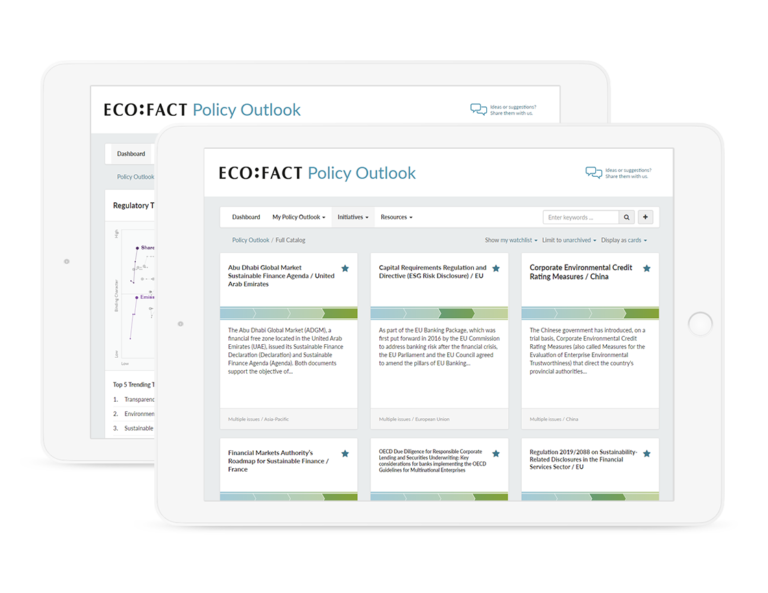The Proposed Directive on Corporate Sustainability Due Diligence in a Nutshell
On February 23, the EU Commission published it long-awaited proposed directive on Corporate Sustainability Due Diligence (Directive). This directive would require companies to conduct environmental and human rights due diligence on their own activities, on their subsidiaries’ activities, and on the value chain operations carried out by companies they have established business relationships with.
The Directive aims to establish minimum requirements for businesses to identify, prevent, cease, mitigate, monitor, disclose, account for, address, and remediate risks related to human rights and the environment. Considering that France and Germany have already adopted similar regulations on due diligence, and that Austria, Belgium, the Netherlands, Luxembourg, and Spain have also started the legislative process to do so, the Directive will harmonize the minimum due diligence obligations throughout the EU.
This proposed directive needs to be discussed, amended, negotiated, and adopted by EU Parliament and Council to enter into force.
Scope of application
The proposed directive applies to EU and non-EU companies as well as financial and non-financial companies. Financial companies are exempt from certain obligations. The Directive would apply to companies that meet the following specific thresholds:
- EU Companies with:
- more than 500 employees on average; and
- a net worldwide turnover of more than EUR 150 million in the last financial year for which annual financial statements were prepared.
- EU Companies with:
- more than 250 employees on average;
- a net worldwide turnover of more than EUR 40 million in the last financial year for which annual financial statements were prepared; and
- at least 50 percent of this net turnover generated by high-impact sectors (e.g. the manufacture of textiles, agriculture, forestry, fisheries, the manufacture of food products, and the extraction of mineral resources).
- Non-EU Companies active in the EU if they:
- generated a net turnover of more than EUR 150 million in the Union in the financial year preceding the last financial year; or
- generated a net turnover of more than EUR 40 million but not more than EUR 150 million in the Union in the financial year preceding the last financial year, with at least 50 percent of this net turnover generated by high-impact sectors (e.g. the manufacture of textiles, agriculture, forestry, fisheries, the manufacture of food products, and the extraction of mineral resources).
Due diligence obligations
According to the proposed directive, companies that meet the above thresholds are required to develop and implement human rights and environmental due diligence processes.
The six “classic” components of due diligence that companies must embrace are those recommended by the UN Guiding Principles on Business and Human Rights and the OECD Due diligence Guidance for Responsible Business Conduct.
- Policies and strategy
Companies must have a due diligence policy in place. They must also integrate due diligence into all their corporate policies.
Directors of companies that fulfill the highest thresholds (500 employees and net worldwide turnover of more than EUR 150 million) must take steps to adapt the corporate strategy so it takes into account the actual and potential adverse impacts identified.
- Identification, prevention, mitigation, and remediation of actual and potential adverse impacts
Companies must take appropriate measures to identify actual and potential adverse human rights and environmental impacts arising from their own operations and those of their subsidiaries as well as from their established business relationships.
Once actual and potential adverse human rights and environmental impacts are identified, companies must take appropriate measures to prevent and to adequately mitigate them.
In terms of exemptions for financial companies, they are:
- obliged to identify actual and potential adverse impacts only before providing a financial service; and
- not obliged to terminate a financial service when this is reasonably expected to cause substantial prejudice to the entity being provided that service.
- Complaints procedure
Companies must implement a complaints procedure (usually called a grievance mechanism) to facilitate the submission of legitimate concerns about actual or potential adverse human rights or environmental impacts. This procedure must be effective and accessible.
- Monitoring policies and processes
Companies must periodically (at least every 12 months) assess their own operations’ due diligence measures, those of their subsidiaries, and those of their established business relationships. This is to monitor the effectiveness of the due diligence processes implemented.
- Reporting
Companies must annually report on their implemented due diligence processes. This reporting should be included in the mandatory non-financial report for companies subject to the non-financial reporting directive (NFRD). For all other companies, this information is to appear in an annual statement published on their websites.
- Climate change plan
Companies that fulfill the highest thresholds (500 employees and net worldwide turnover of more than EUR 150 million) must adopt a plan to ensure that their business model and strategy are compatible with the transition to a sustainable economy and with limiting global warming to 1.5°C in line with the Paris Agreement. The plan should identify the extent to which climate change is a risk for, or an impact of, the company’s operations.
Sanctions and liability
The proposed directive provides some guidance to member states for when they transpose the directive into national law and establish sanctions. Member states must set up effective, proportionate, and dissuasive sanctions. If fines are imposed, they should be based on a company’s turnover.
In addition, companies must be made civilly liable for damages if they do not comply with the due diligence obligations.
 All posts
All posts Contact
Contact



